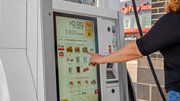Restaurants
Foodservice companies in Asia-Pacific invest big dollars into AR

April 6, 2022
Foodservice companies in the Asia-Pacific region are investing in technologies like augmented reality to raise brand awareness and stay in touch with relevant trends, such as social media and the metaverse, according to GlobalData, a data and analytics company.
GlobalData's thematic report, Augmented Reality (AR) in Foodservice, reveals that foodservice companies are using AR as a utility and as well as an entertainment tool. GlobalData estimates the global AR market, which was worth $7 billion in 2020, to expand at a compound annual growth rate of 36% over the next 10 years.
"AR aids foodservice vendors in resolving challenges associated with environmental, social and governance, economic uncertainty, digital lifestyles and COVID-19," Rupantar Guha, principal analyst in thematic team at GlobalData, said in the release. "It also enables brands to differentiate from their peers by improving consumer engagement and operational efficiency."
In 2020, following the implementation of travel restrictions due to COVID-19, Domino's launched a webAR experience with 8th Wall for its pizza, The World 10 Cheese Quattro, taking consumers on a virtual world tour of the cheeses on the pizza.
"Foodservice companies have been experimenting with AR to engage with customers for years," Jemima Walker, associate analyst in thematic team at GlobalData, said in the release. "For example, Starbucks partnered with Alibaba to bring AR experiences to its Shanghai Reserve Roastery in 2017, educating customers on the cultivation, roastery and serving processes."
Foodservice companies have also been experimenting with AR smart glasses for remote collaboration and operational management across APAC locations. Yum China has deployed AR smart glasses in pilot stores to monitor real-time ordering and serving procedures. Sodexo has launched a program to support remote and isolated sites with AR smart glasses across seven countries.
While this may deliver greater operational efficiency, the high cost of AR smart glasses will restrict the adoption by large quick-service restaurants and foodservice suppliers in the short term, according to the report.
"Although several large foodservice companies have experimented with AR in the APAC region, widespread adoption has been slow," Walker said. "However, GlobalData expects increasing adoption of AR in the future due to the rising acceptance of QR codes, which provides an easy route to initiate AR content on a screen. Asian Big Tech players like Alibaba and specialist AR vendors such as peAR Technologies and Grub Lab will push foodservice companies to adopt AR as a channel to enter the metaverse."
 ChatGPT
ChatGPT Grok
Grok Perplexity
Perplexity Claude
Claude






